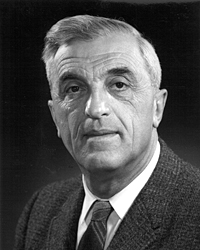Felix Bloch was a Swiss physicist and the winner of the 1952 Nobel Prize.
Bloch was born in 1905 in Zurich, Switzerland. He attended the Federal Institute of Technology in Zurich and went on to study with Werner Heisenberg at the University of Leipzig. During his time in Germany, Bloch also worked with Niels Bohr and Enrico Fermi.
After the rise of Hitler in 1933, Bloch moved to the United States where he accepted a teaching position at Stanford University. Together with Luis Alvarez, Bloch used the 37-inch Berkeley cyclotron to collect some of the first measurements of the neutron magnetic moment. In 1943, Bloch went to Los Alamos where he worked on theoretical problems with Hans Bethe and on implosion with Seth Neddermeyer. Unhappy with the military atmosphere of Los Alamos, however, Bloch soon left for Harvard University, where he researched radar for the duration of the war.
In 1952, Bloch shared the Nobel Prize in Physics with Edward Purcell for his work on nuclear magnetic resonance. The two scientists received the prize “for their development of new methods for nuclear magnetic precision measurements and discoveries in connection therewith.” Bloch would go on to be named the first Director-General of CERN, the European Organization for Nuclear Research.
Bloch died on September 10, 1983 in Zurich.





